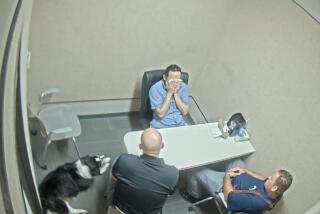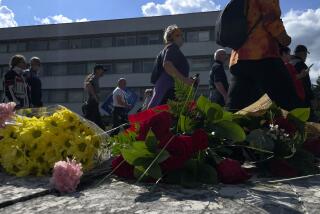Tortured Polish Priest Linked to ‘Suicide’ Probe
- Share via
KRAKOW, Poland — A young Roman Catholic priest who was attacked and tortured in his home over the Easter weekend was involved in efforts to reopen a police investigation into the mysterious death of a Solidarity activist in Krakow two years ago, according to family friends.
The friends, who requested anonymity, said the attack on Father Tadeusz Zaleski, 29, was almost certainly carried out by elements of the security apparatus, possibly with the aim of discrediting Premier Wojciech Jaruzelski’s government as well as terrorizing politically active priests.
In a statement released Tuesday, Cardinal Franciszek Macharski, the archbishop of Krakow, demanded that the attack be fully investigated and that “the source of the threat be liquidated.”
The attack on Zaleski was the second on a Krakow-area priest and the third known act of political violence in the area this year.
A lone masked man attacked Zaleski on Saturday night in the basement of his apartment building, first knocking him unconscious with a blast of a disabling gas, then inflicting numerous cigarette burns on the priest’s face and abdomen in the pattern of the letter “V”--possibly to mock the “victory” sign that Poles often make with their hands at pro-Solidarity gatherings.
The young priest also suffered second-degree burns on one arm where his nylon jacket was set on fire as he lay unconscious. The family friends said he is recuperating at his mother’s apartment in Krakow .
Last year, they said, after four secret police officers were arrested for the murder of Father Jerzy Popieluszko, the unofficial chaplain of the outlawed Solidarity union, a Krakow woman whose activist son had died under mysterious circumstances in the city in 1983 approached Zaleski for help in persuading the authorities to reopen their investigation of the case. The son, identified as Tadeusz Fras, reportedly was found dead in a Krakow street after falling from a window of an apartment building. Despite evidence to the contrary, the sources said, police ruled the death a suicide.
Zaleski was said to have had no success in winning a review of the case. Friends said he intended to pass on evidence suggesting Fras’ murder to an unofficial human rights group in Krakow, one of several formed in Poland after the murder of Popieluszko last year to publicize lesser-known incidents of political violence and other human rights abuses. The government has denounced the groups and threatened legal action against them.
Shadowed for Weeks
“We believe that what happened was because of this,” one family friend said in reference to the young priest’s investigative efforts. This source added that the police appeared to have taken an interest in Zaleski recently, because he had been shadowed for several weeks by unknown men presumed to be police agents.
Zaleski is described as a reserved, soft-spoken man who does not discuss his political views openly. Ordained as a priest less than a year ago, he has been involved in giving religious instruction to retarded and mentally ill children.
“He was never outspoken. He is rather shy and quiet,” one acquaintance said. “He is the sort who enjoys writing poetry, not a politician.”
Recently, however, Zaleski became active in the Mistrzejowice Church in Krakow’s steel-making suburb of Nowa Huta, a church widely known and frequently denounced in the official press as a center of pro-Solidarity activity. In addition to unofficial lectures and art exhibitions, the church holds weekly “patriotic” Masses celebrating the democratic ideals of Solidarity. Thousands of steelworkers and their families attend the Masses faithfully.
Assisting the Pastor
Although he is said not to have spoken at any of these activities, Zaleski was assisting the pastor of the church, Father Edward Jancarz, an avowedly pro-Solidarity priest who was himself the target of an attack in February. Church sources said someone threw a rock through the windshield of Jancarz’s car on the Warsaw-Gdansk highway at almost precisely the same spot where three secret policemen tried to stop Popieluszko’s car with a rock last October, shortly before they succeeded in kidnaping and killing him.
Jancarz was not injured and did not report the incident to the police, the sources said.
Lights Not Working
Polish sources said Zaleski was attacked at about 10:30 Saturday evening after he returned home from an Easter Eve Mass. Descending the stairs to the basement of his apartment building, where he keeps spare parts for children’s wheelchairs, he found that the lights were not working.
“He lit a candle he had with him from the service, and in that moment he saw a masked man holding a metal tube. He remembers a burst of gas, and after that he blacked out,” one source related.
When Zaleski regained consciousness about 20 minutes later, this source said, he felt an excruciating burning sensation on his face, abdomen and one arm. After blacking out again and reviving, he realized that his nylon jacket was ablaze and managed to extinguish it before crawling painfully up the stairs to ring the doorbell at his mother’s apartment.
Family friends said his mother was able to telephone the fire department, the ambulance service and Cardinal Macharski--but not the police--before the line went dead.
Heated Exchange
Macharski came immediately to the apartment and, after the telephone line was restored, had a heated exchange with a senior police official, the sources said. Investigators eventually appeared on the scene, but police reportedly waited until Monday, 48 hours after the attack, to seal the basement and protect any possible remaining clues to the assailant’s identity.
In addition, the sources said, police were reluctant to include three seemingly important points in their formal report of the incident: That Zaleski believed himself to be under surveillance for several weeks, that the telephone had gone dead after three calls on the night of the assault and that a political message had apparently been intended by burning the letter “V” on his face and torso.
All these circumstances, plus the use of a sophisticated knockout gas, suggest police involvement, the sources said. They speculated that all three recent attacks may have been the work of a disgruntled faction in the Interior Ministry that, like the four secret police officers convicted two months ago of Popieluszko’s murder, considers the Jaruzelski regime too soft on Poland’s radical clergy.
“The important question,” he said, “is where is the initiative coming from? Gen. Jaruzelski must be wriiied that he can’t control these people.”
More to Read
Sign up for Essential California
The most important California stories and recommendations in your inbox every morning.
You may occasionally receive promotional content from the Los Angeles Times.










